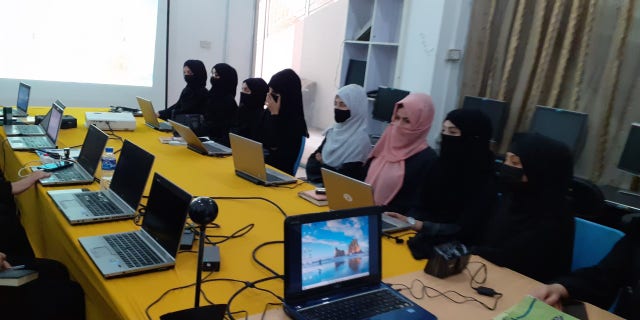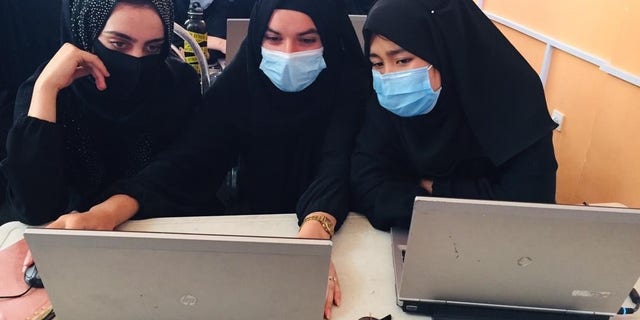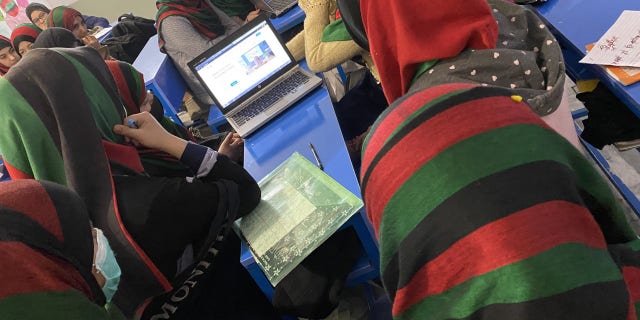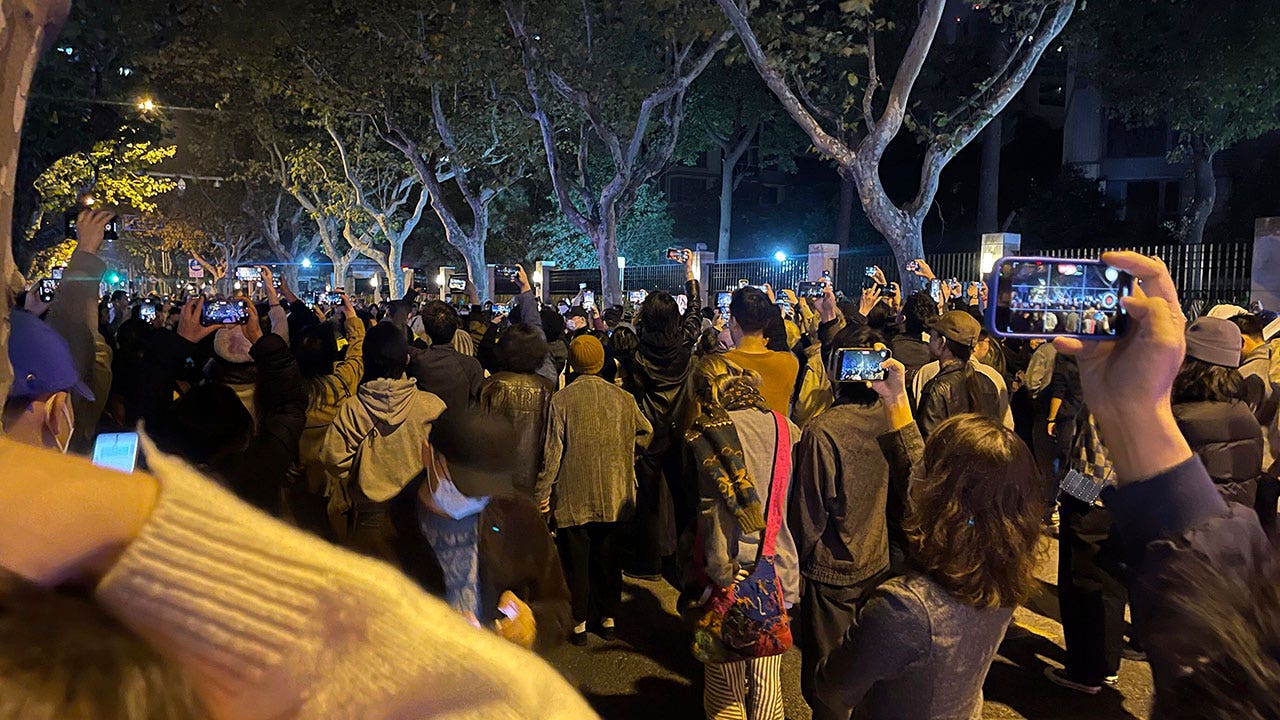The Taliban reneged on their initial promise to allow young girls above the sixth grade to return to school. The abrupt reversal hasn’t stopped Afghan women from keeping up the fight for girls’ education.
“August 2021 hit like a mountain,” Pashtana Dorani, the founder of LEARN Afghanistan, told Fox News Digital.
TALIBAN CANCELS GIRLS’ HIGHER EDUCATION DESPITE PLEDGES
Dorani is at the forefront of the grassroots battle between the Taliban and women’s rights. Dorani started the nonprofit in 2018 to help expand educational opportunities for all across Afghanistan.

Girls studying in an underground school operated by LEARN Afghanistan, a charity set up to help educate Afghan girls.
When the Taliban rolled into Kabul, much to her shock, she was more than prepared with a playbook.
“This was not my first time going rogue.”
Dorani was used to being silenced, even by the previous U.S. backed government, and she knew what she had to do this time around.
“Once the Taliban took over, of course the first 20 to 30 days we were evacuating people and getting people into hiding. Then I realized I can do many more things, but at the end of day we cannot evacuate every girl or teacher, and we have to get around the Taliban,” Dorani said.
TALIBAN DIVISIONS DEEPEN AS AFGHAN WOMEN DEFY VEIL EDICT
The official announcement from the Taliban government came on March 23, which happened to be the first day of school. Young girls eager to return after a tumultuous and uncertain few months of Taliban rule were turned away by Taliban fighters who refused to let them in schools. Some schools actually did reopen, with girls sitting in classrooms ready to learn, only to be told to get up and go home because the Taliban had overturned their policy.
In a scramble to justify the decision, the Taliban cited the lack of female teachers and an appropriate religious uniform for girls. Taliban spokespeople keep telling the country to remain calm and patient while they examine the situation on when it will reopen girls’ secondary education.
TALIBAN TAKE OVER AFGHANISTAN: WHAT WE KNOW AND WHAT’S NEXT
After the Taliban seized Kabul, Dorani and her team regrouped, because many of the people they worked with had fled. “We were left with a small team, and we regrouped, re-strategized, and understood that we cannot have the same situation we had 30 days ago when the Taliban took over, but we can make it somehow better,” Dorani said.

An underground network of schools run by LEARN, a charity formed to educate girls in Afghanistan.
(LEARN)
She was also forced to flee conflicts, fearing for her life, but the fight for education endures.
LEARN operates underground primarily in four provinces: Kandahar, Kabul, Takhar and Bamyan. Each school has about 100 students enrolled with a total of around 400 girls attending various secretive schools throughout the country.
Dorani says the organization operates on what she calls the 75%-25% rule. Twenty-five percent of the cost falls on the tribes and communities to provide the venue and protection for the girls if the Taliban come around. LEARN provides 75% of the fiscal and educational costs, for laptops, electricity, internet, teachers, texts, transportation fees and anything else girls need to get an education.
The worthy endeavor to challenge the Taliban’s policy on girls’ education is not without risks.
“I worry about my own family and my own people, but if I don’t do this, what good am I doing anyway?” Dorani said.
AFGHANISTAN’S TALIBAN MANDATE FACE COVERINGS FOR WOMEN AND ANCHORS
The Taliban’s modernized communications team assured the world that women’s rights, including the right to attend school, would not be harmed. After the Taliban seized Kabul, the new government did everything they could to alleviate the fears of the international community that the new Taliban was not the same as the old.
Shortly after taking power, Taliban spokesperson Zabiullah Mujahid said the new government was “committed to the rights of women” but within the framework of sharia law. The last time the Taliban were in power in Afghanistan, from 1996 until they were overthrown by the U.S. in 2001, they barred almost all girls and women from school and employment.
Afghanistan’s previous experience under Taliban rule prepared many who had lived through those times not to completely give up this time around. “Secret underground schools were a fixture of the Taliban’s previous rule from 1996-2001 and as soon as they regained power a lot of Afghan women who are older and were around last time thought, ‘Here we go again,’” Heather Barr, associate director of the women’s rights division of Human Rights Watch, told Fox News Digital.

Girls studying at an undisclosed location in Afghanistan.
(LEARN)
A return to pre-9/11 archaic governance would jeopardize the much-coveted international aid that kept Afghanistan afloat and is critical to the new Taliban government. To almost all international observers as well as native Afghans, this decision did not come as a shock. Any pretense that the Taliban have changed are seemingly over.
“It’s a fool’s game to keep waiting on them because this is exactly what they did from 1996 to 2001, where they always said the conditions aren’t right or secure at the moment and asked for patience. But that moment never came in that five-year period… nobody has any confidence that the moment will come this time around either,” Barr said.
Many Afghans didn’t bother to wait and see if the Taliban would change their stripes or attempt alternative means of education within Afghanistan. Some desperate families fled for Iran just to send their children to school.
CLICK HERE TO GET THE FOX NEWS APP
There are an estimated 3.7 million children out of school in Afghanistan and over 60% of them are girls, according to united-nations” target=”_blank”>the United Nations< report.
Dorani and others like her won’t let the Taliban completely roll back the progress made and will continue to be a thorn in their side.
“The Taliban know that I challenge them and will always be a pain for them,” Dorani confidently said.









